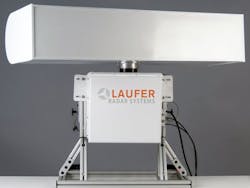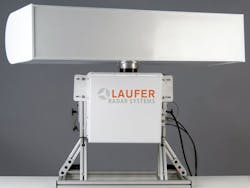Laufer Wind radar-based aircraft detection lighting system operational on wind farm
NEW YORK. The first FAA-approved commercial operation of an aircraft detection lighting system (ADLS) on a U.S. wind farm is now operational, following flight tests. The radar-activated lighting technology from Laufer Wind in New York was installed on a recently constructed and commissioned 80-megawatt (MW) wind farm in Wyoming.
The FAA requires tall structures to be lit as a safety precaution for pilots. Wind farm developers and owners face a unique challenge in addressing local communities’ concerns about the potential for blinking lights at night. The ADLS is designed to mitigate the impact of nighttime lights by deploying a radar-based system around a farm, turning lights on only when low-flying aircraft are detected nearby. Standards for ADLS technology were introduced by the FAA in December 2015.
“Since we turned the system on in Wyoming, we regularly see nights where the lights are off 99% of the time,” says Eric Laufer, founder and president of Laufer Wind. “This is an exciting achievement for us and a step forward for the wind industry. We are proud to have been the first company to successfully demonstrate ADLS to the FAA, the first to receive FAA approval for an ADLS deployment, and the first to achieve commercial operation of an ADLS on a U.S. wind farm. I believe radar lighting will enable more turbines to be permitted and built around the world and we expect to see many more installations in the US in the near future.”
Laufer Radar Systems offers a high-performance pulsed Doppler radar using commercial off-the-shelf (COTS) components to achieve very low cost without sacrificing technical capability. The technology is currently deployed as a central component of the Laufer Wind Aircraft Detection System, an FAA-tested radar-activated obstruction lighting technology designed to turn wind turbines’ aviation warning lights on or off depending on the presence of aircraft in the near proximity.
Search the Aerospace & Defense Buyer's Guide
The go-to resource for Intelligent Aerospace technology news & information:
Covering key topics
Across all market segments
Subscribe to the free Intelligent Inbox e-newsletter
Subscribe to receive all the latest aerospace technology news & information, delivered directly to your e-mail inbox twice a week (Tuesdays and Thursdays). Sign upfor your free subscription to the Intelligent Inbox e-newsletter at http://www.intelligent-aerospace.com/subscribe.html.
Connect on social media
Keep pace with aerospace innovation and opportunities via your favorite social media channels. Connect with Intelligent Aerospace on Twitter (@IntelligentAero), LinkedIn,Google+, and Instagram.


